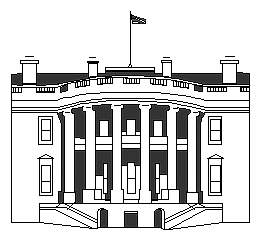 "The
power of the Executive Branch is vested in the President of the
United States, who also acts as head of state and
Commander-in-Chief of the armed forces. The President is
responsible for implementing and enforcing the laws written by
Congress and, to that end, appoints the heads of the federal
agencies, including the Cabinet."* Source
White.gov "The
power of the Executive Branch is vested in the President of the
United States, who also acts as head of state and
Commander-in-Chief of the armed forces. The President is
responsible for implementing and enforcing the laws written by
Congress and, to that end, appoints the heads of the federal
agencies, including the Cabinet."* Source
White.gov
"Other
than to succeed to the presidency upon the death or resignation
of a president, a vice president's only constitutional duty is
to preside over the Senate. Vice presidents cannot vote in the
Senate, except to break a tie, nor may they formally address the
Senate, except with the senators' permission." Source
Senate.gov |